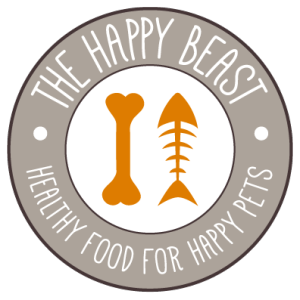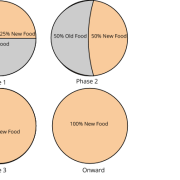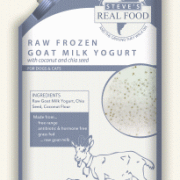Ending the Monotony Meal Plan: The Benefits of Pet Food Rotation
At The Happy Beast, we believe that there are significant benefits from pet food rotation. In fact, we think it’s a big pet food myth that animals should eat the same formula of the same brand of food for their whole lives. While this is a great marketing ploy for the pet food companies (who don’t want you to feed anything but their brand of food) it is not in the best interest of your animal’s health and well-being. For one thing, eating the same thing over and over is boring… just imagine eating one kind of cuisine for every meal for the rest of your life! Even more importantly, from a health perspective, a monotonous diet can have negative effects on your animal for the following reasons:
- Although pet foods are formulated to be “balanced and complete,” it’s unlikely that one food will meet all of an animal’s nutrient requirements over a long period of time.
- Feeding one food may cause your animal to develop an intolerance or allergy to the ingredients in that food.
- The digestive system of an animal that has only had to process one kind of food will be weaker and less tolerant to changes and natural aging.
The good news is that there are many ways to incorporate pet food rotation into your animal’s diet:
- Even if you like feeding a specific brand, choose a different recipe or protein source each time you buy a bag, box, or can of food. Most companies offer several formulas. If you usually feed a chicken recipe, try bison or fish.
- If you normally feed dry food or kibble, supplement with another, less processed food. Raw, dehydrated, freeze-dried, and canned foods can all make great mix-ins.
- Add fresh food. “Table scraps” aren’t necessarily bad as long as you’re not feeding them during a meal at the table! Just limit what “people food” you share with your animals to healthy foods like lean meats, salmon skins, yogurt, and cooked vegetables. Although small fish bones are fine, you should not typically feed larger “table scrap” bones because they have been cooked. In comparison to raw bones, cooked bones can more easily splinter and cause a choking risk.
If your animal has a very sensitive digestive system or has been eating the same food for a very long time:
- Add in new foods very slowly.
- Supplement the diet with a prebiotic, probiotic, or digestive enzyme. (We like Optagest or raw goat milk.)
Chicken, turkey, lamb, and beef are often used in pet foods, but new protein sources are making their way into the market. “Novel proteins” is an industry term for meats not commonly found in pet foods. We commonly recommend novel protein diets for animals with food sensitivities or allergies, but healthy animals can benefit from these meats as well. Try including goat, rabbit, venison, alligator, or kangaroo in your animal’s next pet food rotation!
If variety isn’t the spice of life, is it catnip?




